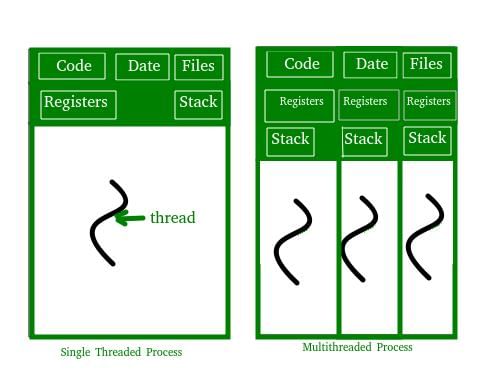Computer Science Engineering (CSE) Exam > Computer Science Engineering (CSE) Questions > Which one of the following is NOT shared by t...
Start Learning for Free
Which one of the following is NOT shared by the threads of the same process?
- a)Stack
- b)Address Space
- c)File Descriptor Table
- d)Message Queue
Correct answer is option 'A'. Can you explain this answer?
Verified Answer
Which one of the following is NOT shared by the threads of the same pr...
Threads can not share stack (used for maintaining function calls) as they may have their individual function call sequence.

Most Upvoted Answer
Which one of the following is NOT shared by the threads of the same pr...
Threads can not share stack (used for maintaining function calls) as they may have their individual function call sequence.

Free Test
FREE
| Start Free Test |
Community Answer
Which one of the following is NOT shared by the threads of the same pr...
Threads can not share stack (used for maintaining function calls) as they may have their individual function call sequence.


|
Explore Courses for Computer Science Engineering (CSE) exam
|

|
Question Description
Which one of the following is NOT shared by the threads of the same process?a)Stackb)Address Spacec)File Descriptor Tabled)Message QueueCorrect answer is option 'A'. Can you explain this answer? for Computer Science Engineering (CSE) 2025 is part of Computer Science Engineering (CSE) preparation. The Question and answers have been prepared according to the Computer Science Engineering (CSE) exam syllabus. Information about Which one of the following is NOT shared by the threads of the same process?a)Stackb)Address Spacec)File Descriptor Tabled)Message QueueCorrect answer is option 'A'. Can you explain this answer? covers all topics & solutions for Computer Science Engineering (CSE) 2025 Exam. Find important definitions, questions, meanings, examples, exercises and tests below for Which one of the following is NOT shared by the threads of the same process?a)Stackb)Address Spacec)File Descriptor Tabled)Message QueueCorrect answer is option 'A'. Can you explain this answer?.
Which one of the following is NOT shared by the threads of the same process?a)Stackb)Address Spacec)File Descriptor Tabled)Message QueueCorrect answer is option 'A'. Can you explain this answer? for Computer Science Engineering (CSE) 2025 is part of Computer Science Engineering (CSE) preparation. The Question and answers have been prepared according to the Computer Science Engineering (CSE) exam syllabus. Information about Which one of the following is NOT shared by the threads of the same process?a)Stackb)Address Spacec)File Descriptor Tabled)Message QueueCorrect answer is option 'A'. Can you explain this answer? covers all topics & solutions for Computer Science Engineering (CSE) 2025 Exam. Find important definitions, questions, meanings, examples, exercises and tests below for Which one of the following is NOT shared by the threads of the same process?a)Stackb)Address Spacec)File Descriptor Tabled)Message QueueCorrect answer is option 'A'. Can you explain this answer?.
Solutions for Which one of the following is NOT shared by the threads of the same process?a)Stackb)Address Spacec)File Descriptor Tabled)Message QueueCorrect answer is option 'A'. Can you explain this answer? in English & in Hindi are available as part of our courses for Computer Science Engineering (CSE).
Download more important topics, notes, lectures and mock test series for Computer Science Engineering (CSE) Exam by signing up for free.
Here you can find the meaning of Which one of the following is NOT shared by the threads of the same process?a)Stackb)Address Spacec)File Descriptor Tabled)Message QueueCorrect answer is option 'A'. Can you explain this answer? defined & explained in the simplest way possible. Besides giving the explanation of
Which one of the following is NOT shared by the threads of the same process?a)Stackb)Address Spacec)File Descriptor Tabled)Message QueueCorrect answer is option 'A'. Can you explain this answer?, a detailed solution for Which one of the following is NOT shared by the threads of the same process?a)Stackb)Address Spacec)File Descriptor Tabled)Message QueueCorrect answer is option 'A'. Can you explain this answer? has been provided alongside types of Which one of the following is NOT shared by the threads of the same process?a)Stackb)Address Spacec)File Descriptor Tabled)Message QueueCorrect answer is option 'A'. Can you explain this answer? theory, EduRev gives you an
ample number of questions to practice Which one of the following is NOT shared by the threads of the same process?a)Stackb)Address Spacec)File Descriptor Tabled)Message QueueCorrect answer is option 'A'. Can you explain this answer? tests, examples and also practice Computer Science Engineering (CSE) tests.

|
Explore Courses for Computer Science Engineering (CSE) exam
|

|
Signup for Free!
Signup to see your scores go up within 7 days! Learn & Practice with 1000+ FREE Notes, Videos & Tests.


















